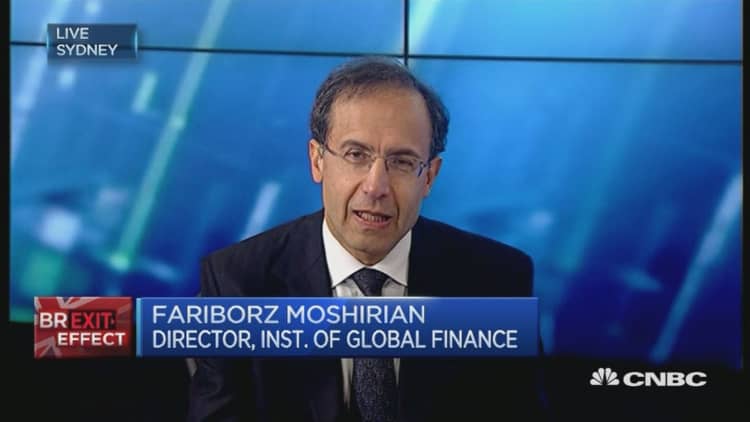
Promises by the architects of the U.K. campaign to exit the European Union (EU) to speedily re-negotiate trade deals appear set to disappoint, according to analysts.
Observers point to a confluence of factors that are likely to prolong what expect to be testy negotiations and heighten uncertainty following the shock vote.
For one, the U.K.'s relationship and communication with the EU has deteriorated this week.
"The relationship is not that good," Fariborz Moshirian, director of the Institute of Global Finance at UNSW Business School, told CNBC's "The Rundown."
On Tuesday, Nigel Farage, leader of the U.K. Independence Party, a member of the European Parliament since 1999 and a main architect in the campaign to leave the EU, was greeted with "boos" as he stood to speak at a special meeting of European Parliament in Brussels on Tuesday.
At the meeting, President of the European Commission Jean-Claude Juncker addressed Farage head-on.
"You were fighting for the exit, the British people voted in favor of the exit. Why are you here?" Juncker said.
That came as the U.K. remains in political chaos after Prime Minister David Cameron submitted his resignation in the wake of the Brexit vote.
There was a risk that the will on both sides to meet in the middle would be lacking, noted John Woods, chief investment officer for Asia Pacific for Credit Suisse Private Banking.
The worst-case scenario was that the U.K. could be completely locked out of the EU, he said on Tuesday, but added that it wouldn't be in the EU's best interest to shut out its largest trading partner.
Political animosity aside, there were other signs that the U.K. won't be able to negotiate a solid trade deal, not just with the EU, but with other trading partners.
"The onerous exercise of trying to renegotiate a bilateral trade agreement with every single major trading partner clearly is quite a large exercise, not least because, to be fair, there are not many experienced trade negotiators in the U.K.," Woods said. "It's Brussels that have been doing that for the last 40 years. So there's a learning curve."
That learning curve would be steep: Once the U.K. invokes Article 50 to begin the process of extricating itself from the EU, it only has two years to negotiate a deal.
At least one leave pundit, Roger Bootle, executive chairman of Capital Economics and a member of the eight-strong Economists for Brexit, had speculated prior to the referendum that the U.K. could begin the talks, wait until a deal was close and then invoke its right to exit, stretching the period of negotiations to longer than two years, possibly into a decade.
But EU officials quickly put the kibosh on that notion, saying there would be no negotiations until the U.K. pulled the trigger. That would likely put the U.K. in a weaker negotiating position.
"The negotiations people are talking about at the moment are not as simple as they anticipate," Moshiran said. There is no guarantee that the U.K. will get the best deal."
He recalled the 2015 Greek referendum to protest the austerity to be imposed as part of the country's third bailout. Afterward, Greece, while under the gun ahead of a likely financial meltdown, accepted a deal with even harsher terms, he noted.
That's also been the message from EU officials. German Chancellor Angela Merkel warned Tuesday that the U.K. will not be able to "cherry pick" its favorite privileges, while ignoring its responsibilities.
She noted that non-member Norway had negotiated access to the EU's single market by agreeing in return to accept migration from the EU, among other concessions.
The "leave" camp ran heavily on promises to restrict immigration from the bloc.
To be sure, the EU has a long history of successful all-nighter negotiations to pull off last-minute deals.
Credit Suisse's Woods noted that his central view is that a trade deal would be reached.
"There is enough self-interest and mutual benefit to ensure that the exit negation and ultimate arrangement between the two parties is such that it will result in a reasonable outcome," he said.
But others noted that uncertainty was the only known.
"There is literally nothing we actually know" about how the Brexit negotiations will be handled, said Jahangir Aziz, head of emerging market economics at JPMorgan.
Follow CNBC International on Twitter and Facebook.
—By CNBC.Com's Leslie Shaffer; Follow her on Twitter @LeslieShaffer1. Kate Rooney contributed to this article.


